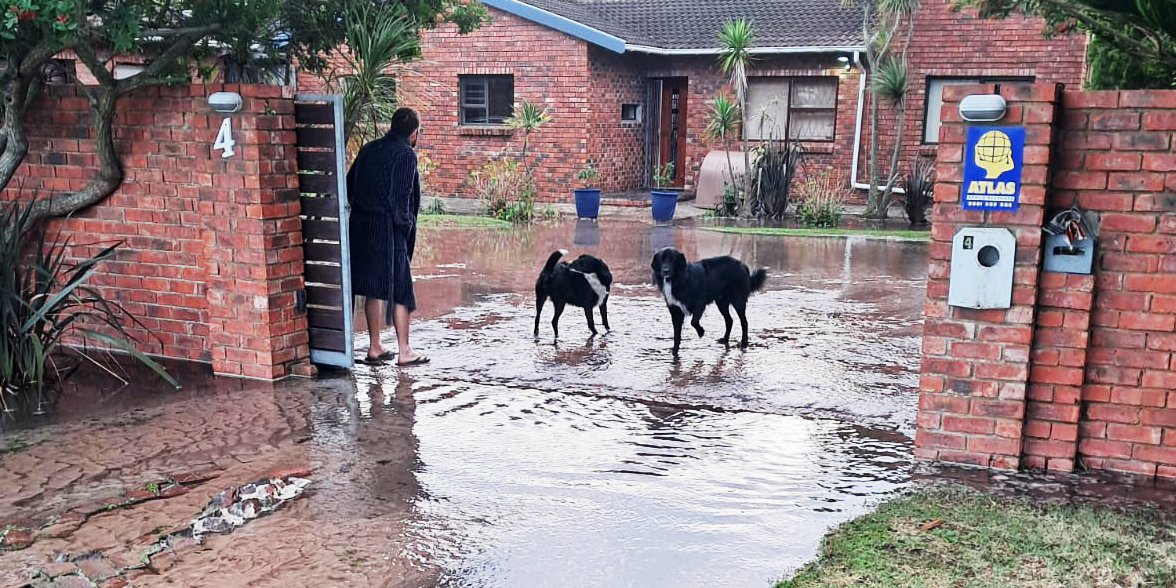With almost daily water pipe bursts, sometimes leaving sinkholes in paved driveways, and deep, dangerous trenches where municipal teams have attempted repairs, one of Nelson Mandela Bay’s fastest-growing suburbs is facing a severe water crisis.
Ward 8 councillor Gustav Rautenbach said he feared the ageing water pipes of the fast-growing suburb of Lorraine, where many townhouse complexes have been and are being developed, can no longer take the strain of its increasing population.
/file/dailymaverick/wp-content/uploads/2025/07/WhatsApp-Image-2025-07-13-at-13.53.jpg)
After a public meeting late last week, called by Rautenbach and attended by acting city manager Ted Pillay, water and sanitation officials and about 40 residents, the metro’s experts produced a report admitting that the ageing infrastructure of the area has become “prone to failure” due to several factors, but they were unable to find any other causes for the frequent pipe bursts.
On Sunday, another four properties were flooded after yet another pipe burst on Verdun Road. This prompted an exasperated Rautenbach to call for private sector experts to be sent in to help.
He said the metro had, for years, allowed and approved additional developments in the area, especially of townhouses, without upgrading the water infrastructure.
Baffling failures
Now the suburb is facing sometimes baffling water shortages, on top of those caused by burst pipes.
“In parts of the ward, the water will just go off even if there isn’t a burst pipe and then come back on again without intervention.”
Rautenbach said that in one instance, he found a valve that had been closed and not reopened, and he has found one valve that operates anti-clockwise rather than clockwise.
However, pipe bursts in the area are causing a much bigger problem.
“I don’t know why, but the pipes often break around 2am,” Rautenbach said. “But the municipal call centre only works from around 6am to 10pm, and then, even though there is a standby team on duty, there is nobody that can send them out. Also, this means that we have to wait ... for someone to close the valves so that the water can stop running.”
He said at this stage, even with the call centre on duty, they work on two or three hours’ response time.
Steep water loss costs
Non-revenue water losses have been flagged as one of the big risks to the financial sustainability of the metro. It is estimated that the metro has, since 2023, lost between 42% and 48% of its potable water to leaks, pipe breaks and illegal connections.
Rautenbach said that in the past month alone, he believed the metro lost millions of litres of fresh water because of the pipe bursts over a few blocks in Lorraine.
Pillay said at the public meeting that it appeared that the problem had worsened in the past five weeks. “Something is not right,” he said.
/file/dailymaverick/wp-content/uploads/2025/07/WhatsApp-Image-2025-07-13-at-13.533.jpg)
He said the municipality would implement various interventions to deal with the pressure issues and the burst pipes.
“We will monitor the situation from my side and from your side,” he told the meeting. “There is a bigger plan we need to look at. We can’t stop growth.”
But Rautenbach, who has been the ward councillor in the area since 2000, said between 2004 and 2006, there had been a population explosion in his ward. No adjustments were made to municipal infrastructure after many townhouse complexes were built.
He managed to have a moratorium on new developments approved in 2006, but this was lifted in 2008 without any major upgrades to the municipal infrastructure in the area, except for a stormwater drain and a few water pipes.
‘Serious trouble’
“We are in serious trouble now,” he said. “In parts of this ward, the infrastructure is already imploding. We need immediate action.”
He said he was considering asking for another moratorium on new developments.
Among the problems in the ward, Rautenbach pointed out, was that the metro appeared to be under the impression that 8,000 people lived in his ward.
He said a conservative estimate was that there were 7,000 housing units in Ward 8 with voters’ roll of about 12,000. A conservative estimate of three people a house would mean that at least 21,000 people lived in Ward 8. Yet no budget had been set aside to improve ward infrastructure.
“The metro appears to ignore that the only areas where the metro can still grow are towards the west (where Lorraine is),” he said.
Read more: SA’s ideal of affordable housing is in a chokehold, gasping for air
The streets most affected are Sedan Avenue, Vitry Avenue, Courcelles Road, Metz Avenue, Gisela and Luneville Roads, Lacroix Road and Longwy Avenue, Verdun Road and Dijon Road - all in Lorraine; Paulus Street and Martha Streets in Kamma Park and Marguerite Street in Kragga Kamma Park.
Rautenbach said it was time experts from the private sector were called in.
/file/dailymaverick/wp-content/uploads/2025/07/WhatsApp-Image-2025-07-13-at-13.534.jpg)
The report commissioned by Pillay further found that high demand could cause intermittent water outages, but also said that a 450mm pipe that had been blocked to deal with “frequent bursts” could also contribute to water problems.
The metro report confirmed four streets in the metro, Upper Montmedy, Longewy Avenue, Verdun Road and Vitry Avenue, as well as their surrounding areas, had suffered extensive water problems in the past weeks.
According to this report, a troubleshooting team found that low reservoir levels, malfunctioning pressure-regulating valves or clogged strainers had not caused the pipe bursts.
More water would be pumped into the Chelsea Reservoir and a few other technical adjustments would be made to see if it helped the problem, according to the report. Officials also said there would be a comprehensive hydraulic survey of the area.
Pillay further ordered the immediate restoration of verges where trenches were dug to repair the pipes. DM




 Another pipe burst in Lorraine in July flooded several properties. (Photo: Gustav Rautenbach / Supplied)
Another pipe burst in Lorraine in July flooded several properties. (Photo: Gustav Rautenbach / Supplied)